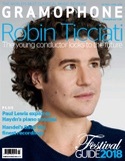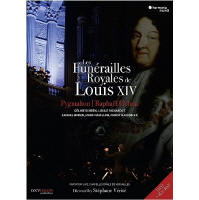Texte paru dans: / Appeared in: |
|
 |
Outil de traduction (Très approximatif) |
|
Reviewer:
David Vickers
Prolonged exequies for Louis XIV culminated at the abbey of Saint-Denis on October 23, 1715, in a funeral service that involved both of the court’s principal musical institutions – the Musique de la Chapelle and Musique de la Chambre – performing from a gallery erected especially for the occasion. Music may have been heard at various other stages during eight days of ceremonial rites but no reliable details are known. The recent tercentenary of the Sun King’s exequies was a perfect opportunity for a commemorative concert filmed at the Chapelle Royale in Versailles. In numerous ways – not least the different location and speculative minutiae of the programme – this is not a reconstruction but instead a quasi-liturgical presentation that places two magnificent grands motets by Lalande among plenty of plainchant sung from different areas of the chapel (accompanied by a serpent, and occasionally sung as overly operatic solos), and also several brief, simple and small motets by lesserknown contemporaries. Devised in collaboration with musicologist Thomas Leconte, this conjectural fantasy affords creative licence for Pygmalion and Raphaël Pichon to create a beguilingly dolorous musical experience. There is no older-fashioned polyphonic Mass of the sort that was certainly sung during the funeral in 1715 (Leconte acknowledges that Du Caurroy’s Missa pro defunctis or an obscure setting by Charles d’Helfer are the likeliest bets). The audience is immersed in darkness during this theatrical representation; for what seems like eternity tiny lamps attached to the choir’s music folders provide the only light in the chapel as they move silently between stations for plainchants and small choral pieces. The architectural glory of the building is revealed eventually when brighter stage lights illuminate the main performance area for Lalande’s De profundis – the only piece certainly performed in 1715, and which bursts with thrilling modernity into the hitherto archaic solemnity.
Pygmalion’s elegantly sensual
orchestral playing and choral singing are sensational from start to finish. Five
soloists sing with impeccable gracefulness and fluency, such as Samuel Boden,
Marc Mauillon and Christian Immler’s sweetly plangent trio (‘Lacrymosa’) in
Lalande’s extraordinary Dies irae. There is vitality in Pygmalion’s
broadly emotive phrasing, thrilling harmonic tensions in choral climaxes, and a
sculpted expression of refined catharsis. English subtitles turn out to be
merely a transcript of the sung Latin texts, and there is no documentary, so the
DVD format offers nothing other than the opportunity to watch fantastic
music-making in action – but the concert on its own terms enables us to
experience Lalande in a fresh creative context. |
|




